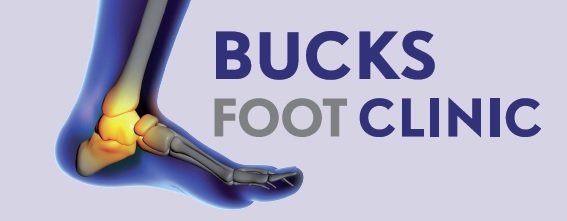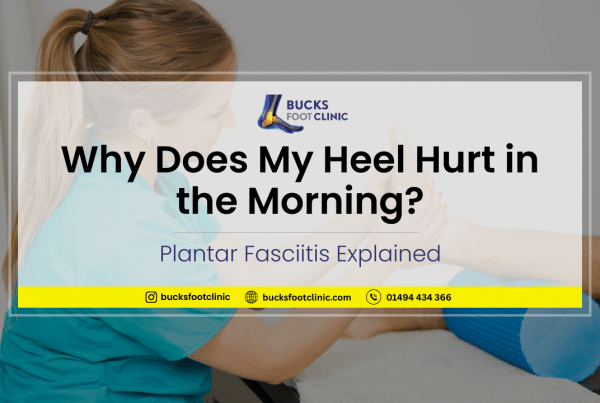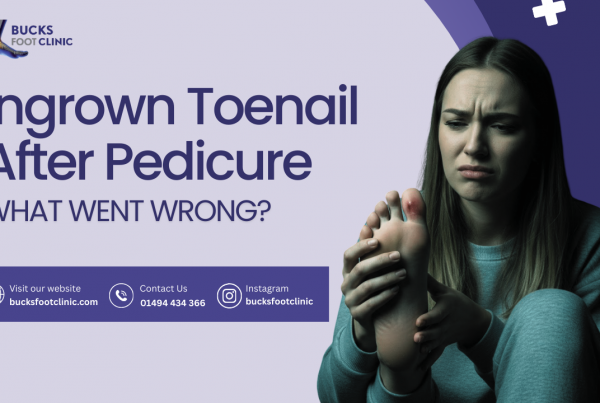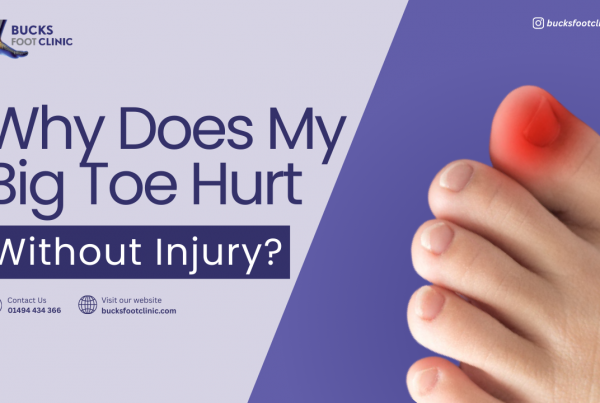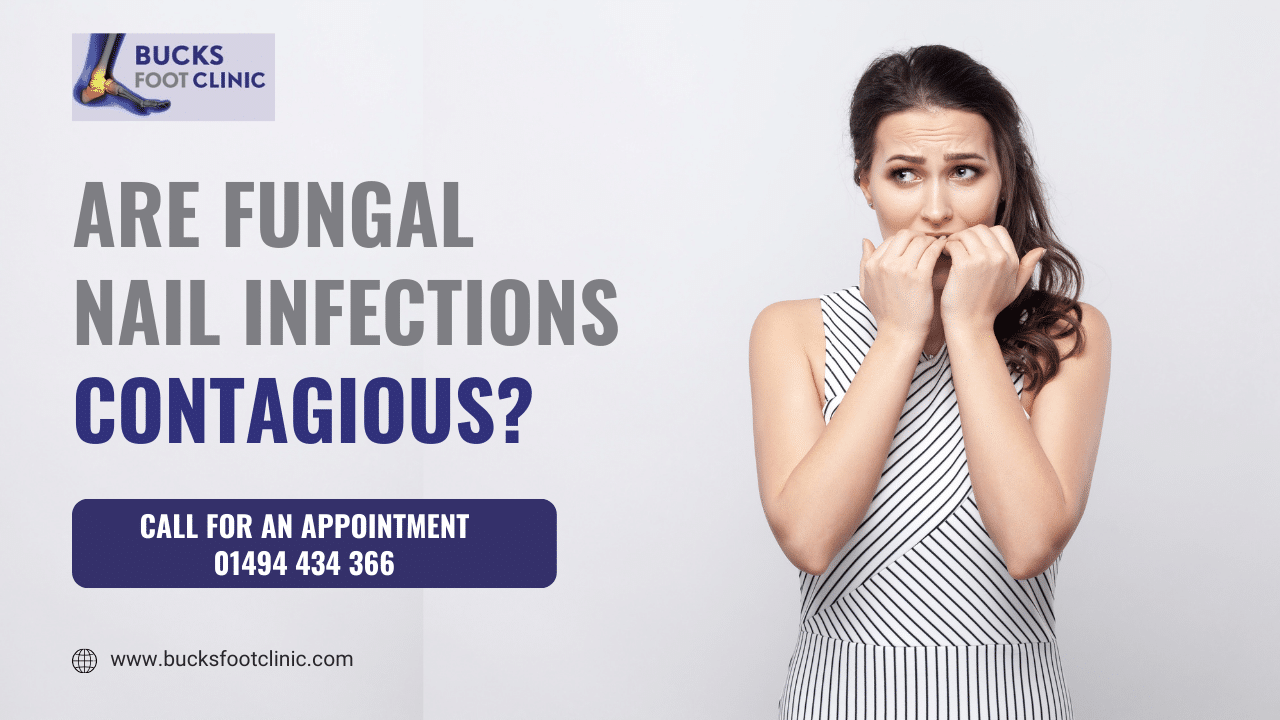
Are Fungal Nail Infections Contagious? How Bucks Foot Clinic (Amersham) Keeps Families Safe
If you’ve noticed yellowing, thickening, or crumbling toenails in your household, you’re likely wondering whether toenail fungus contagious Amersham searches might reveal an uncomfortable truth about spreading infections amongst family members. The concerning reality is that fungal nail infections, medically known as onychomycosis, are indeed contagious and can spread from person to person through direct contact or shared environments. At Bucks Foot Clinic nail infection prevention specialists, we’ve helped countless Buckinghamshire families understand, treat, and prevent the spread of these stubborn infections through professional podiatric care.
Understanding How Fungal Nail Infections Spread
Fungal nail infections thrive in warm, moist environments and spread through microscopic fungal spores that can survive on surfaces for extended periods. These resilient organisms, primarily dermatophytes, can transfer between family members through seemingly innocent daily activities. Walking barefoot on contaminated floors, sharing nail clippers or towels, and using communal shower facilities all present opportunities for transmission.
The infection typically begins when fungal spores penetrate the nail through tiny cuts or separations between the nail and nail bed. Once established, the fungus feeds on keratin, the protein that forms your nails, causing the characteristic discolouration, thickening, and brittleness that many sufferers experience. What makes these infections particularly challenging is their ability to spread not only between toes on the same foot but also to fingernails and other family members.
Research indicates that approximately 10% of the UK population suffers from fungal nail infections, with rates increasing significantly amongst older adults and those with underlying health conditions such as diabetes or compromised immune systems. In family settings, the risk of transmission increases substantially when one member has an active infection, particularly if preventive measures aren’t implemented promptly.
Common Transmission Routes in Household Settings
Within the home environment, bathrooms represent the highest risk areas for fungal transmission. The combination of warmth, moisture, and frequent barefoot traffic creates ideal conditions for fungal proliferation. Bath mats, shower floors, and bathroom tiles can harbour fungal spores for weeks, potentially infecting multiple family members who use these facilities.
Bedrooms also present transmission risks, particularly through shared footwear, socks, and bedding. Fungal spores can survive in fabric fibres, making contaminated clothing and linens potential vectors for infection spread. Additionally, carpeted areas where family members walk barefoot can become reservoirs for fungal spores, especially in homes with inadequate ventilation or high humidity levels.
Swimming pools, gyms, and changing rooms frequented by family members pose additional external risks. These communal spaces often feature the warm, moist conditions that fungi favour, and the high foot traffic increases exposure likelihood. Children participating in sports activities or elderly relatives attending aqua aerobics classes may unknowingly bring infections home, highlighting the importance of protective footwear in these environments.
How to Prevent Fungal Nail Infections: Essential Protection Strategies
Personal Hygiene Measures
- Daily foot washing and thorough drying: Pay particular attention to spaces between toes where moisture accumulates
- Regular nail maintenance: Keep nails trimmed short and filed smooth to prevent fungal entry points
- Moisture management: Change socks daily, choosing moisture-wicking materials over cotton when possible
- Footwear rotation: Allow shoes to dry completely between wears, ideally for 24-48 hours
- Anti-fungal powder application: Use preventive powders in shoes and on feet, especially during warmer months
Household Prevention Protocols
- Designated personal items: Assign individual nail clippers, files, and towels to each family member
- Regular surface disinfection: Clean bathroom floors, shower bases, and bath mats with anti-fungal solutions weekly
- Footwear in communal areas: Encourage wearing slippers or sandals in bathrooms and around swimming pools
- Laundry precautions: Wash potentially contaminated items in hot water (60°C minimum) with anti-fungal additives
- Environmental control: Maintain adequate ventilation and humidity levels below 50% where possible
Lifestyle Modifications
- Breathable footwear choices: Select shoes made from natural materials that allow air circulation
- Sock selection: Choose synthetic moisture-wicking socks over cotton for athletic activities
- Post-exercise protocols: Change out of damp socks and shoes immediately after physical activity
- Regular foot inspections: Check feet and nails weekly for early signs of infection
- Immune system support: Maintain overall health through balanced nutrition and regular exercise
Why a Podiatrist Is Better Than Home Remedies
Whilst numerous home remedies circulate online, from tea tree oil applications to vinegar soaks, professional podiatric treatment offers superior outcomes for several compelling reasons. At Bucks Foot Clinic, our podiatrists possess the expertise to accurately diagnose fungal infections, distinguishing them from similar-appearing conditions such as psoriasis, trauma-induced nail changes, or bacterial infections that require entirely different treatment approaches.
Professional assessment enables identification of the specific fungal strain causing infection, allowing for targeted treatment selection. Our podiatrists can prescribe prescription-strength topical and oral anti-fungal medications that demonstrate significantly higher cure rates than over-the-counter alternatives. Studies show professional treatment achieves cure rates of 60-80%, compared to less than 10% for most home remedies.
Furthermore, podiatrists can address underlying factors contributing to infection susceptibility. Biomechanical abnormalities, circulation issues, or immune system concerns may predispose individuals to recurring infections. Professional evaluation identifies these risk factors, enabling comprehensive treatment plans that address root causes rather than merely treating symptoms.
The advanced treatments available through podiatric clinics, including laser therapy and professional-grade topical solutions, penetrate the nail plate more effectively than home preparations. Our specialists also provide proper nail debridement, removing infected tissue safely without causing additional damage or spreading infection to surrounding areas.
Perhaps most importantly, professional monitoring ensures treatment effectiveness and prevents complications. Untreated or improperly treated fungal infections can lead to permanent nail damage, secondary bacterial infections, and in diabetic patients, serious complications including cellulitis or foot ulcers.
How to Fix Fungal Nail Infections: Professional Treatment Options
Initial Assessment and Diagnosis
- Comprehensive foot examination: Visual inspection and microscopic analysis of nail samples
- Laboratory testing: Fungal culture to identify specific pathogen strains
- Medical history review: Assessment of underlying health conditions affecting treatment options
- Risk factor evaluation: Identification of lifestyle or environmental factors requiring modification
- Treatment planning: Customised approach based on infection severity and patient circumstances
Treatment Modalities
- Topical prescription medications: Professional-strength solutions that penetrate nail plates effectively
- Oral anti-fungal therapy: Systemic medications for severe or resistant infections
- Laser treatment: Advanced technology destroying fungal cells without damaging surrounding tissue
- Nail debridement: Professional removal of infected nail portions to enhance medication penetration
- Combination therapy: Multi-modal approaches for stubborn infections
Ongoing Management
- Regular monitoring appointments: Track treatment progress and adjust protocols as needed
- Preventive care education: Personalised guidance for avoiding reinfection
- Family screening: Assessment of household members to prevent infection cycles
- Footwear and hygiene recommendations: Specific product suggestions based on individual needs
- Long-term maintenance planning: Strategies for preventing future infections
Protecting Your Family’s Foot Health
The contagious nature of fungal nail infections makes prompt professional treatment essential for protecting entire households. At Bucks Foot Clinic in Amersham, we’ve witnessed how untreated infections can circulate through families for years, causing unnecessary discomfort and embarrassment. Our comprehensive approach combines cutting-edge treatments with practical prevention strategies, breaking infection cycles and restoring healthy nails.
Early intervention significantly improves treatment outcomes and reduces transmission risk. If you notice nail discolouration, thickening, or brittleness in any family member, professional assessment can prevent spread to others. Our podiatrists understand the unique challenges families face when managing contagious conditions and provide discrete, effective solutions tailored to your household’s needs.
We also recognise that children, elderly relatives, and immunocompromised family members require special consideration. Our treatments accommodate these vulnerable populations, ensuring safe, appropriate care for all ages and health conditions. Through education and preventive care, we empower families to maintain healthy feet long-term.
Conclusion
Fungal nail infections are indeed contagious and pose genuine risks for household transmission. However, with proper understanding, prevention strategies, and professional treatment when needed, families can effectively manage and eliminate these infections. The key lies in recognising early warning signs, implementing preventive measures consistently, and seeking professional podiatric care rather than relying solely on home remedies.
At Bucks Foot Clinic in Amersham, our experienced podiatrists combine advanced treatments with practical prevention education, helping Buckinghamshire families overcome fungal nail infections safely and effectively. Don’t let concerns about toenail fungus contagious Amersham transmission keep your family from enjoying healthy, confident feet. Professional treatment offers the most reliable path to infection resolution and prevention, protecting your loved ones from this common but treatable condition.
Remember, whilst fungal nail infections can spread between family members, they’re entirely manageable with proper care and professional guidance. Taking action at the first signs of infection, maintaining good foot hygiene practices, and partnering with qualified podiatrists ensures your family’s foot health remains protected. Contact Bucks Foot Clinic today to learn how our nail infection prevention specialists can help safeguard your household from fungal nail infections.
Fungal Nail Infections – FAQs
Q: Are fungal nail infections contagious?
A: Yes, fungal nail infections can spread from person to person and from one nail to another.
Q: How do fungal nail infections spread?
A: They spread through direct contact with an infected nail or by touching surfaces contaminated with fungal spores.
Q: Can I catch a fungal nail infection from someone else’s shoes or socks?
A: Yes, sharing shoes, socks, or nail tools with someone who has an infection increases the risk.
Q: Can fungal infections spread to the skin?
A: Yes, the fungus can spread to surrounding skin and cause skin infections like athlete’s foot.
Q: Does walking barefoot in public places increase the risk?
A: Yes. Damp, communal areas like showers and pools are common places to pick up fungus.
Q: How can I reduce the risk of catching a fungal nail infection?
A: Keep feet clean and dry, avoid sharing footwear or tools, wear protective footwear in public areas, and maintain good foot hygiene.
Q: Can treatment stop the infection from spreading?
A: Yes. Effective treatment can eliminate the fungus and reduce the chance it spreads to others.
Q: Should I see a specialist for a fungal nail infection?
A: Yes, especially if it keeps spreading, involves multiple nails, or doesn’t respond to basic care.
